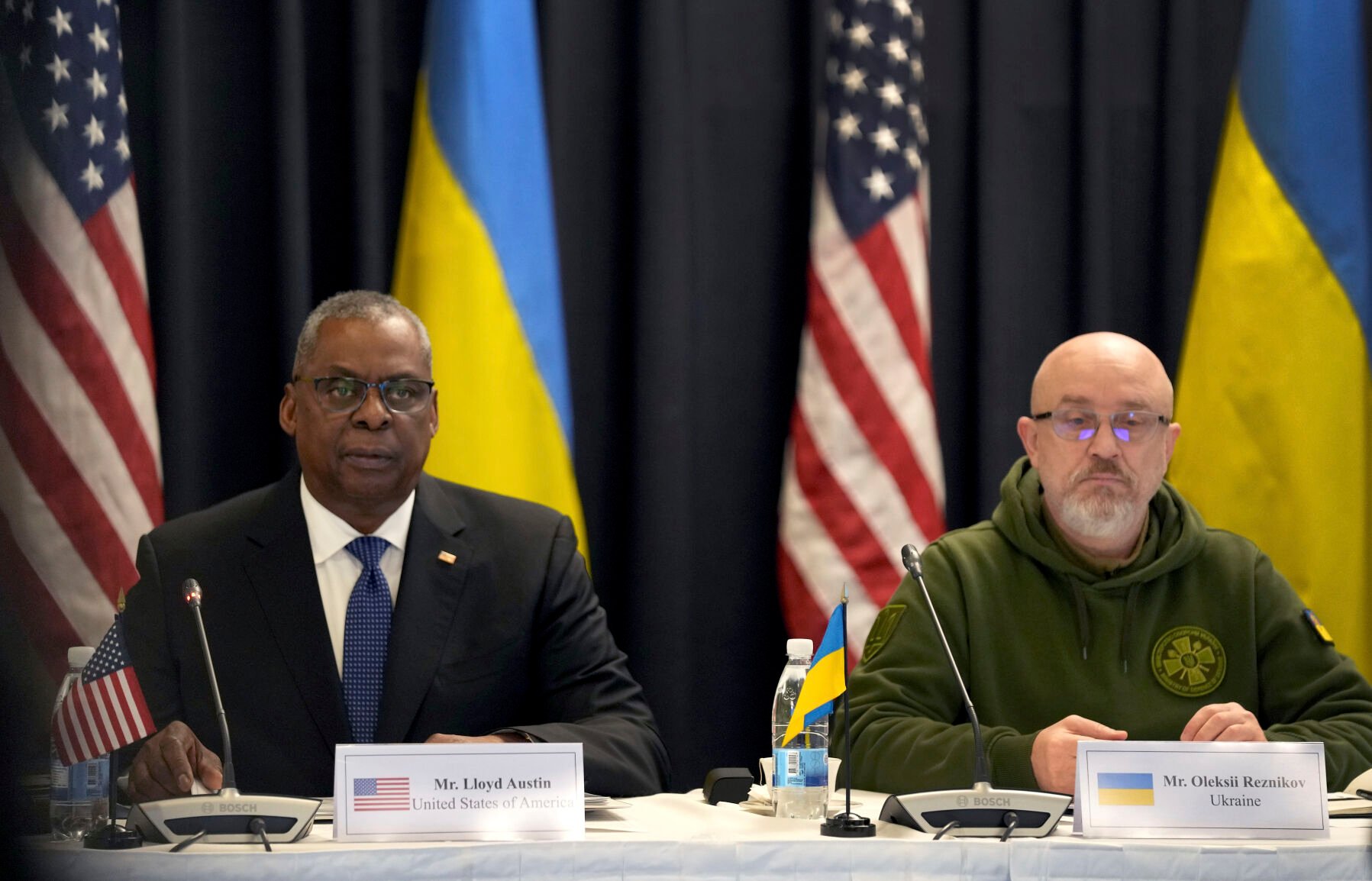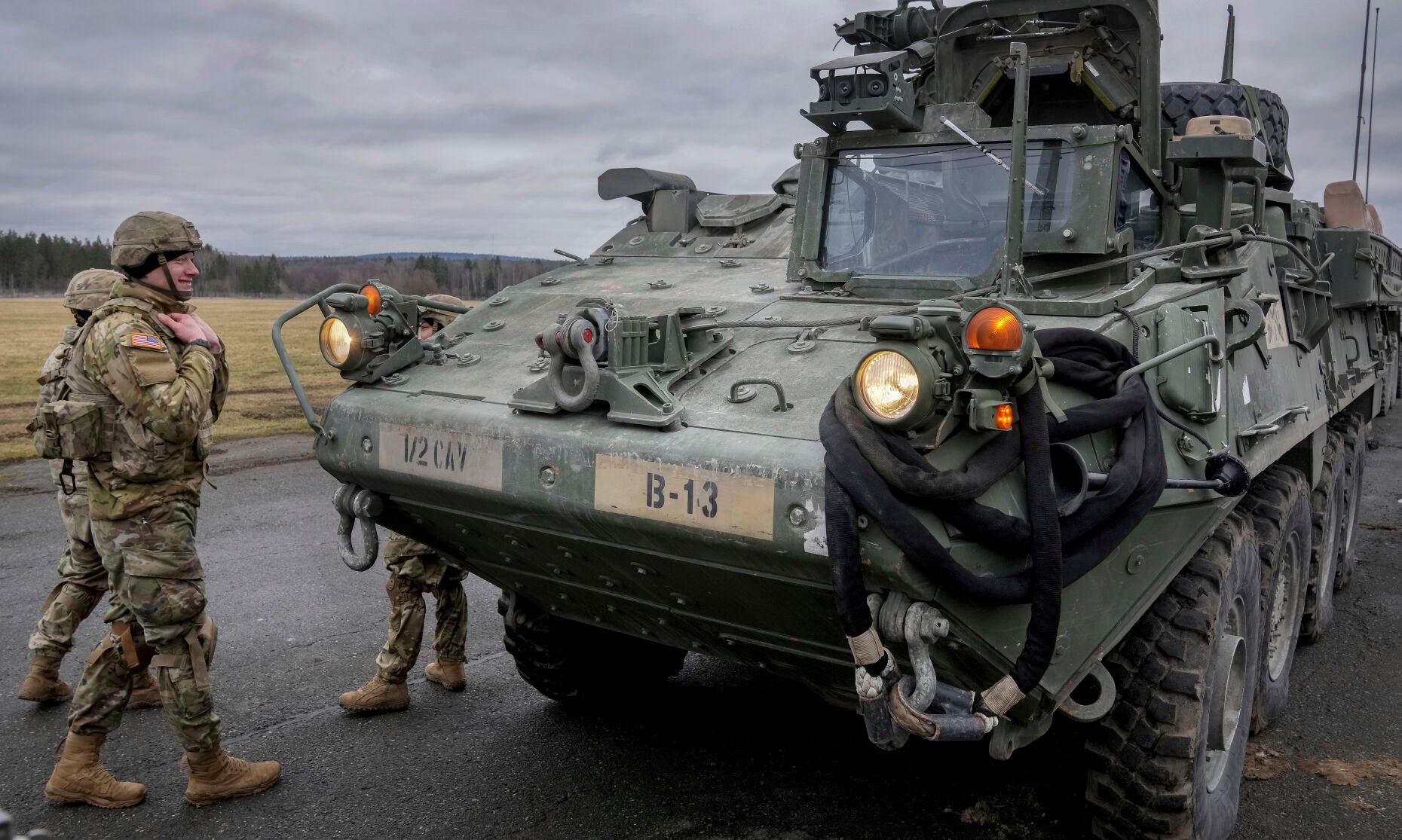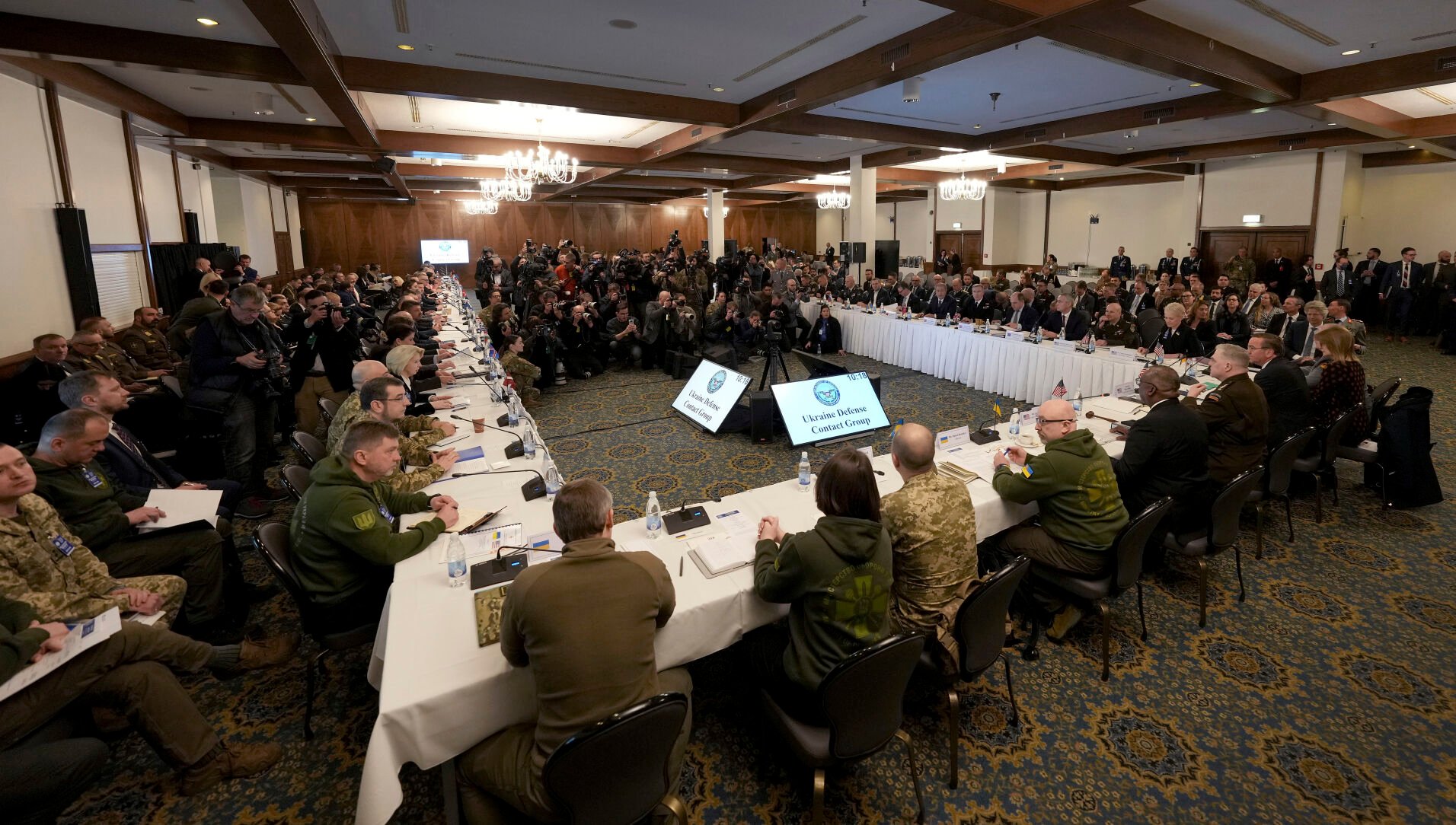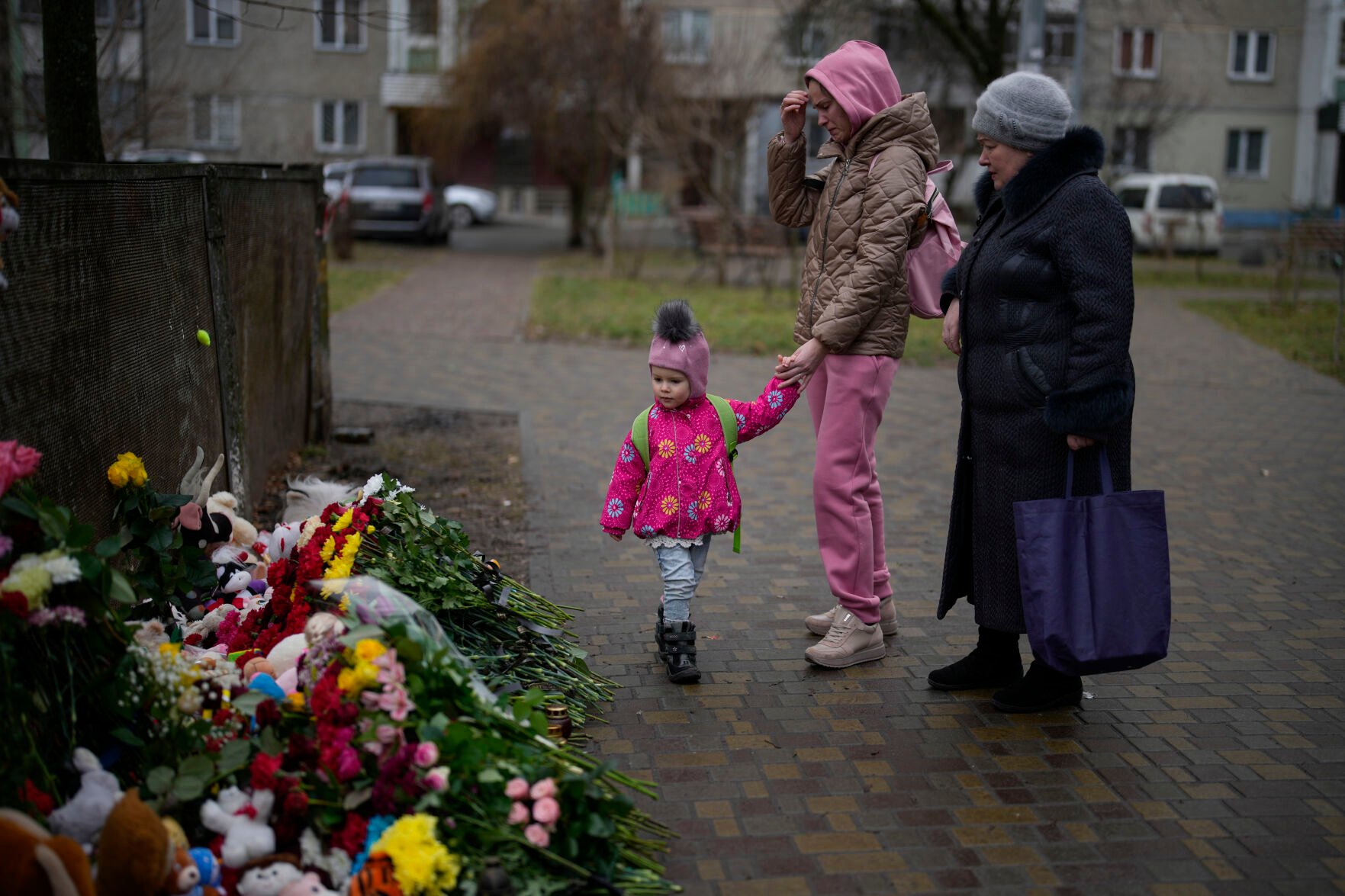Defense chiefs fail to resolve dispute on tanks for Ukraine
RAMSTEIN AIR BASE, Germany — Ukraine will have to wait longer to find out if it will get advanced German-made battle tanks.
A dispute over sending the tanks from Western allies to help Ukraine against Russia’s invasion played out both in public and private on Friday, as more than 50 defense leaders meeting in Germany failed to hammer out an agreement — stalled by Berlin’s hesitation.
Failure to reach agreement on what has become an urgent request from Ukrainian leaders largely overshadowed commitments from a number of nations — including the U.S. — to send billions of dollars in equipment and weapons to the war effort.

Michael Probst, Associated Press
U.S. Defense Secretary Lloyd Austin, left, and the Ukrainian participant Oleksii Reznikov, right, attend the meeting of the Ukraine Defense Contact Group on Friday at Ramstein Air Base in Germany.
While U.S. and NATO leaders denied any dissension in the ranks and praised Germany for its widespread weapons and training contributions to Ukraine, a smaller group of leaders met privately with the Germans to try to find common ground. They were unable to forge a consensus on sending the German-made Leopard tanks.
Polish Defense Minister Mariusz Blaszczak said Friday that 15 countries that have the Leopards discussed the issue but no decisions were made. He called the meeting a “good discussion among allies” and said the matter would be discussed again at future talks.
Germany would need to agree for the tanks to be given to Ukraine, which is not a member of NATO. Despite pleas from Ukrainian officials, Germany so far has resisted mounting pressure to quickly supply Leopard 2 tanks to Kyiv, or at least clear the way for other countries to deliver them from their own stocks.
Asked at the close of the Friday meeting whether Germany was “doing enough,” U.S. Defense Secretary Lloyd Austin responded, “Yes, but we can all do more.”
“They are a reliable ally and they’ve been that way for a very, very long time,” he said. “And I truly believe that they’ll continue to be a reliable ally going forward.”
Austin also downplayed the immediate importance of tanks, noting the U.S. Stryker combat vehicles and Bradley armored vehicles that are being sent would give Ukraine new capabilities in the war. “This isn’t really about one single platform,” he said.

Michael Probst, Associated Press
Soldiers of the 2nd Cavalry Regiment stand next to a Stryker combat vehicle Feb. 9, 2022, in Vilseck, Germany.
The defense leaders heard an impassioned plea for more military aid from Ukrainian President Volodymyr Zelenskyy. Speaking via video link, he told the gathering that “terror does not allow for discussion.” He added, “the war started by Russia does not allow delays.”
Germany acknowledged there had been no resolution. But, speaking to reporters outside the conference hall, Defense Minister Boris Pistorius said, “We will make our decisions as soon as possible.”
Pistorius said he had ordered the ministry to look into Germany’s tank stocks so he can be prepared for a possible green light and be able to “act immediately.” He added that Germany will “balance all the pros and contras before we decide things like that. … I am very sure that there will be a decision in the short term but … I don’t know how the decision will look.”
The issue, however, has grown increasingly complicated.

Michael Probst, Associated Press
Participants attend the meeting of the Ukraine Defense Contact Group on Friday at Ramstein Air Base in Germany.
The U.S. has resisted providing its own M1 Abrams tanks to Ukraine, citing extensive and complex maintenance and logistical challenges with the high-tech vehicles. Washington believes it would be more productive to send German Leopards, since many allies have them and Ukrainian troops would need less training than on the more difficult Abrams.
U.S. and German officials have given mixed signals about whether the U.S. and German decisions are linked.
A U.S. official familiar with White House thinking said Germany has expressed hesitance to providing its tanks unless the U.S. sends Abrams. The official, who spoke on the condition of anonymity to discuss private Biden administration deliberations, added that there was some bewilderment in the administration over the German position, since Britain, another NATO ally, already agreed to provide Challenger 2 tanks.
Steffen Hebestreit, a spokesman for the German government, denied that Berlin has demanded that the U.S. supply Abrams tanks alongside any shipment of Leopards.
Meanwhile, a Kremlin spokesman said deployment of Western tanks would trigger “unambiguously negative” consequences.
“All these tanks will require both maintenance and repairs, and so on, so (sending them) will add to Ukraine’s problems, but will not change anything with regard to the Russian side achieving its goals,” spokesman Dmitry Peskov said at a media briefing.

Daniel Cole, Associated Press
People pay their respects Friday at the scene where a helicopter crashed Wednesday in Brovary, on the outskirts of Kyiv, Ukraine.
Russia claimed Friday to have captured a village in eastern Ukraine as part of its monthslong push toward the city of Bakhmut.
Russian Defense Ministry spokesman Igor Konashenkov said the village of Klishchiivka, five miles south of Bakhmut, had been “liberated.” The claim couldn’t be independently verified, and Ukrainian officials made no immediate comment.
Taking Klishchiivka would be a minor breakthrough, but the Kremlin is hungry for good news after months of setbacks. Bakhmut would be a bigger prize that could allow Russia to disrupt Ukrainian supply lines in the east and threaten other Ukrainian-held cities.
However, U.S. officials have begun to nudge the Ukrainians to shift focus away from Bakhmut and focus on preparation for an offensive in the south, according to an official familiar with the views of President Joe Biden’s administration.
